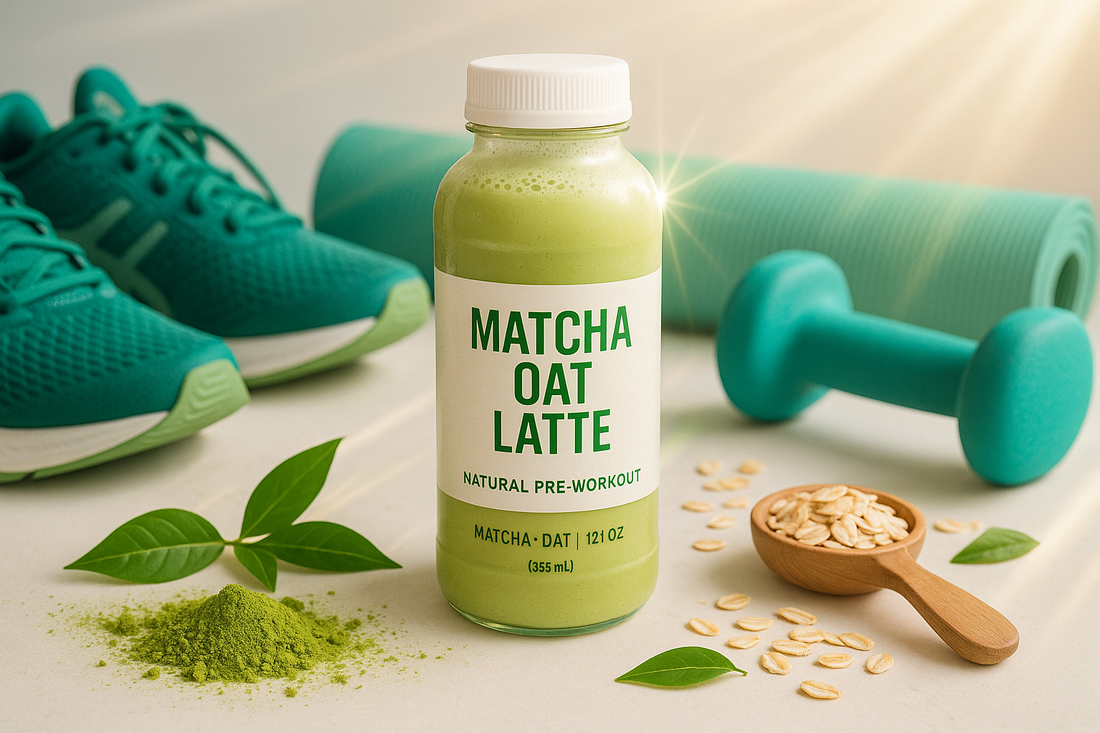
Synthetic pre‑workout supplements are often marketed as magic solutions for energy and performance, but they can come with uncomfortable side effects. Ingredients like sodium bicarbonate and magnesium can cause nausea or diarrhoea[1], while stimulants such as synephrine have been linked to chest pain and heart palpitations[1]. Many pre‑workouts also deliver huge doses of caffeine, leading to jitters, headaches, tingling and digestive upset[1]. Our ready‑to‑drink matcha oat latte offers a gentler, science‑backed alternative that supports endurance, focus and recovery—without synthetic additives.
Matcha’s unique nutrient profile
Matcha is shade‑grown, finely milled green tea. Because you ingest the whole leaf, you consume higher concentrations of beneficial compounds. In a 2023 study, daily consumption of a matcha beverage significantly reduced subjective fatigue and lowered salivary cortisol after exercise compared with a placebo group[2]. The matcha group also gained more skeletal muscle mass and showed positive changes in gut microbiota that correlated with strength gains[2].
Matcha contains double the catechin content of regular green tea, as well as lutein, vitamin K, dietary fibre and amino acids like theanine[3]. These micro‑compounds have antioxidant effects, scavenging reactive oxygen species generated during exercise[3]. Dietary fibres and catechins help modulate the gut microbiota and reduce fatigue[3]. The amino acid L‑theanine reduces stress and enhances nutrient metabolism[3]. Together, these components support muscle adaptation, protein synthesis and recovery[2][3].
The caffeine–L‑theanine advantage
Unlike coffee or energy drinks, matcha naturally balances caffeine with L‑theanine. This combination produces a calm, sustained energy boost[4]. Studies show that caffeine and L‑theanine together improve reaction time, working memory and task accuracy, while reducing headaches and tiredness[4]. Participants who consumed matcha and caffeine completed more work and showed improved attention compared with placebo[4]. In other words, matcha helps you feel focused and ready without the crash associated with high caffeine doses.
How to incorporate matcha into your workout routine
-
Pre‑workout boost: Drink one bottle of House of Matcha oat latte about 30 minutes before your workout. This allows time for the caffeine and L‑theanine to enter your bloodstream, providing steady energy when you start exercising.
-
Warm‑up synergy: Pair your pre‑workout latte with dynamic stretching or a light cardio warm‑up. The improved reaction time and focus from matcha may help you perform exercises with better form and coordination[2][4].
-
During workout: Stay hydrated by sipping water; matcha promotes hydration and metabolism[5]. Unlike sugary drinks, it doesn’t spike insulin or cause stomach upset.
-
Post‑workout recovery: Matcha’s antioxidants may help reduce delayed‑onset muscle soreness and inflammation[5]. After exercise, enjoy another latte or incorporate matcha into a protein smoothie to support muscle repair and replenish nutrients.
Avoiding common pre‑workout pitfalls
Remember that natural doesn’t mean unlimited. Matcha still contains caffeine, so avoid consuming more than 2–3 servings per day and monitor your body’s response. If you’re sensitive to caffeine or pregnant, consult your doctor before changing your routine.
Bottom line: House of Matcha’s ready‑to‑drink oat latte provides steady energy, improved focus and recovery benefits through its unique combination of caffeine, L‑theanine, catechins and other micronutrients. By replacing synthetic supplements with a natural beverage, you can enhance your workouts safely and enjoyably. Share your experience with #HouseOfMatchaMove—we’d love to hear how matcha fuels your movement.
References
[1] Pre‑workout supplements can cause digestive upset, nausea, diarrhoea, headaches, tingling and chest pain due to ingredients like sodium bicarbonate, magnesium and stimulants such as synephrinehealthline.comhealthline.comhealthline.com.
[2] In a trial, daily matcha consumption reduced subjective fatigue and salivary cortisol, increased skeletal muscle mass and favourably altered gut microbiota compared with placebopmc.ncbi.nlm.nih.gov.
[3] Matcha contains high levels of catechins, lutein, vitamin K, dietary fibre and L‑theanine; these antioxidants scavenge reactive oxygen species, modulate the gut microbiota, reduce fatigue and enhance nutrient metabolismpmc.ncbi.nlm.nih.gov.
[4] The combination of caffeine and L‑theanine improves reaction time, working memory and task accuracy while reducing headaches and fatigue; participants consuming matcha and caffeine performed better on attention‑demanding tasks than those consuming caffeine alonecureus.comcureus.com.
[5] Matcha promotes hydration and metabolism and its antioxidants may reduce delayed‑onset muscle soreness and inflammation.